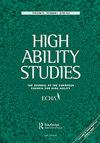Examining the influence of multiple performance characteristics on selection into a representative team in field hockey
IF 1.8
4区 教育学
Q2 EDUCATION, SPECIAL
引用次数: 1
Abstract
ABSTRACT The aim of this study was to determine what kind of performance characteristics distinguish between different skill levels at different development stages in field hockey using a multi-dimensional testing battery. A total of 100 players identified as “talented” (51.0% girls) and 105 recreational level players (41.0% girls) divided over three age groups (U13/U15/U18) performed anthropometric, physical capacity, sport-specific technical skill and decision-making tests and completed self-regulation and sport history questionnaires. Gender specific multivariate analysis with playing level and age group as factors and age as a covariate were performed. Results revealed that experienced selectors and coaches select players for representative teams predominantly based on their dribbling skills, passing/hitting skills and speed and endurance. Furthermore, it is clear that selection for such a representative team is strongly influenced by maturational status and accumulated field hockey specific training hours. Interestingly, no differences were found between the self-regulatory skills of state and club level players for either gender. This study highlighted the performance characteristics deemed to be important by selectors and coaches and emphasized the need to consider the strong influence of maturational status and practice history when selecting “talented” players as these factors don’t translate to future sporting success.考察多种表现特征对曲棍球代表队选拔的影响
摘要本研究的目的是使用多维测试组来确定曲棍球在不同发展阶段不同技能水平之间的表现特征。共有100名被认定为“天才”的球员(51.0%为女孩)和105名娱乐级别的球员(41.0%为女孩,分为三个年龄组(U13/U15/U18)进行了人体测量、体能、运动专项技术技能和决策测试,并完成了自我调节和运动史问卷调查。以比赛水平和年龄组为因素,年龄为协变量,进行了性别特异性多变量分析。结果显示,经验丰富的选拔人员和教练主要根据球员的运球技术、传球/击球技术以及速度和耐力为代表性球队挑选球员。此外,很明显,选择这样一支具有代表性的球队在很大程度上受到成熟状态和累积的曲棍球专项训练时间的影响。有趣的是,无论男女,州和俱乐部级别球员的自律技能都没有差异。这项研究强调了选拔人员和教练认为重要的表现特征,并强调在选择“有天赋”的球员时,需要考虑成熟状态和训练历史的强烈影响,因为这些因素不会转化为未来的体育成功。
本文章由计算机程序翻译,如有差异,请以英文原文为准。
求助全文
约1分钟内获得全文
求助全文
来源期刊

High Ability Studies
Multiple-
CiteScore
4.80
自引率
11.10%
发文量
7
期刊介绍:
High Ability Studies provides a forum for scholars in a variety of disciplines associated with the development of human abilities to their highest level. It is a medium for the promotion of high ability, whether through the communication of scientific research, theory, or the exchange of practical experience and ideas. The contents of this journal are unique in reflecting concerns and recent developments in this area from childhood and across the whole life span in a variety of contexts. Far from being restricted to the traditional focus on high-level cognitive development, it also presents investigations into all other areas of human endeavour, including sport, technology, the arts, business, management and social relations.
 求助内容:
求助内容: 应助结果提醒方式:
应助结果提醒方式:


